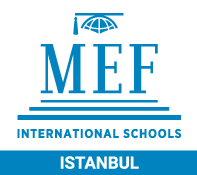For our PYP (Primary Years Programme) classes at MEF, the ICT (Information and Communication Technology) curriculum is crafted to empower students to explore and develop essential skills in technology, problem-solving, and digital citizenship. This program emphasizes creativity, logical thinking, and responsible technology use, equipping students with the skills to navigate an evolving digital world. Our ICT curriculum is aligned with international standards, including ISTE (International Society for Technology in Education), CSTA (Computer Science Teachers Association), and Cambridge Primary Digital Literacy standards, ensuring that students build globally relevant competencies.
PYP ICT Learning Structure and Key Outcomes
ICT lessons are delivered through a combination of homeroom sessions and dedicated sessions in the computer lab, providing a dynamic and engaging experience:
- Device Use by Grade Level: In Grades 1 and 2, students are provided with classroom iPads to support their learning. Starting in Grade 3, students bring their personal iPads to school, fostering a sense of ownership and allowing for a more personalized learning experience. These devices are used for a range of activities, from coding and game design to digital storytelling and research.
- Homeroom Sessions: In their regular classroom setting, students work on digital projects using iPads. Activities include digital storytelling, video creation, and introductory game design. These projects encourage creativity and reinforce design thinking skills through real-world applications.
- Computer Lab Sessions: In the lab, students deepen their technical skills, learning to navigate operating systems, use productivity software, and practice coding with platforms like Scratch and Code.org. These projects involve building algorithms, designing interactive games, and developing digital stories, applying computational thinking in creative ways.
Key Learning Outcomes by Skill Area
Aligned with ISTE, CSTA, and Cambridge standards, the curriculum focuses on building a well-rounded skill set in ICT:
- Coding and Algorithms: Students explore foundational coding concepts, such as sequences, loops, and conditionals, to create simple programs and understand the core principles of computer science.
- Game Design: Through platforms like Scratch, students experiment with creating simple games, integrating interactive elements and developing logical structures, refining their work through iterative testing.
- Minecraft Education and MakeCode: In ICT clubs, students use Minecraft Education to navigate and build in a virtual world, while exploring coding concepts through MakeCode, fostering problem-solving and creativity in a game-based setting.
- 3D Design and Printing: Students explore 3D design and modelling using Tinkercad and Simlab, and bring their creations to life through 3D printing, developing skills in digital design, spatial reasoning, and engineering.
- Digital Storytelling: Using digital tools, students express themselves by creating interactive stories that combine visual and textual elements, enhancing creativity while building technical literacy and communication skills.
- Data and Information Literacy: Students gain foundational skills in managing information, learning to store, retrieve, and analyze data using digital tools. These skills are crucial for developing responsible digital habits and understanding information systems.
- Exploring Emerging Technologies (VR/AR): Students also gain exposure to Virtual Reality (VR) and Augmented Reality (AR), enhancing their understanding of immersive technology and its applications, and preparing them to thoughtfully engage with these tools.
- Exploring Artificial Intelligence (AI): Starting in the upper primary grades, students are introduced to AI, including how it works and its real-world applications. A strong focus is placed on the ethical use of AI tools, helping students understand the importance of using AI responsibly, respecting privacy, and recognizing the implications of AI on society.
- Digital Citizenship: Lessons emphasize safe and ethical online behavior, covering topics like privacy, responsible communication, digital footprint and etiquette, to foster a strong sense of digital responsibility.
This internationally aligned curriculum equips PYP students with a strong foundation in ICT, preparing them to be thoughtful, capable, and creative digital citizens. Through hands-on and screen-based activities, students develop the skills needed to innovate and communicate effectively in a technology-driven world.
Related policies to our ICT framework:



